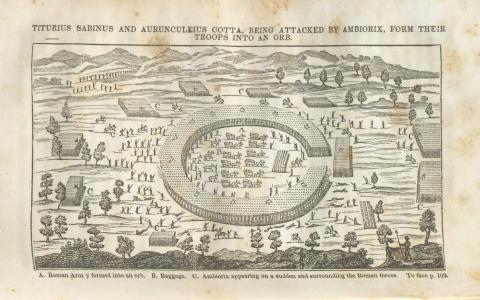At barbarīs cōnsilium nōn dēfuit. Nam ducēs eōrum tōtā aciē prōnūntiāre iussērunt, nē quis ab locō discēderet, illōrum esse praedam atque illīs reservārī quaecumque Rōmānī relīquissent: proinde omnia in vīctōriā posita exīstimārent. Erant et virtūte et studio pūgnandī parēs. Nostrī, tametsī ab duce et ā fōrtūnā dēserēbantur, tamen omnem spem salūtis in virtūte pōnēbant, et quotiēns quaeque cohors prōcurrerat, ab eā parte māgnus numerus hostium cadēbat. Quā rē animadversā, Ambiorīx prōnūntiārī iubet ut procul tēla cōniciant neu propius accēdant et quam in partem Rōmānī impetum fēcerint cēdant: levitāte armōrum et cotīdiānā exercitātiōne nihil hīs nocērī posse: rūrsus sē ad sīgna recipientēs īnsequantur.
notes
Ambiorix's forces attack the column in a defile.
ne quis: 'that no one' (Gaisser) ( A&G 310.a).
studio pugnandi: 'in eagerness for fighting'. This incorporates the emendation of Davies for the manuscripts' reading, 'numero pugnandi', which makes no sense and is obelized in the OCT.
quotiens... procurrerat... cadebat: a general condition referring to past time. ( A&G 518.b)
levitate…posse: a declarative sentence in indirect discourse, inserted parenthetically. The dative his refers to the Eburones (vobis in the mouth of Ambiorix). (Hodges) ( A&G 580)
Qua re animadversa: ablative absolute. Qua is a connecting relative (Gaisser) ( A&G 308.f).
propius: 'closer,' i.e., 'too close' (Gaisser) ( A&G 291.a).
levitate armorum, &c.: 'that from the lightness of their arms, &c., it must result that no harm would be done them'. (Moberly). noceri is impersonal passive and nihil is adverbial: '[Ambiorix said] that it was not at all possible that injury be done to them ...'
ad signa recipientes: the standards were fixed in the ground, thus indicating the alignment of the circle. (Allen & Judson)
rursus…insequantur: 'and that they should follow them when they again fell back (se recipientes) to their standards'. (Hodges)
vocabulary
prōnuntǐo, -āre: state publicly, declare; give out orders
rěservō, -āre, -āvi, -ātum: to keep back, save up, reserve
prŏindē adv.: therefore
tămetsi conj.: although, even though
prōcurro, -ĕre, -curri, -cursum: run, run forward; dart forward; charge
cădo, -ĕre, cĕcĭdi, cāsum: fall
ănĭmadverto, -ĕre, -ti, -sum: notice, observe
cōnĭcĭo, -ĕre, -iēci, -iectum: hurl; drive; put, place; direct, construct
prōprǐus, -a, -um: not common with others; particular
cōtīdǐānus, -a, -um: every day, daily
exercĭtātĭo, -ōnis f.: training
insĕquor, -i, -cūtus: follow up, pursue

